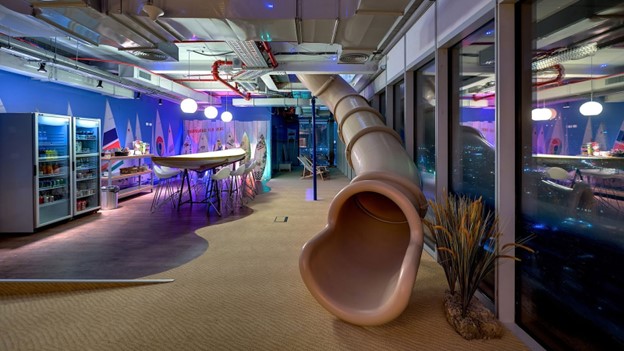Once the apple of job-seekers eyes, big tech companies competed for visionaries to join their ranks and help create the next big thing in technology. Recently, though, difficult financials resulted in painful decisions involving large-scale layoffs, restructuring, project delays and even cancellations.
Years ago, I bought my son, at the time a high schooler, a book titled Are You Smart Enough to Work at Google? The guide has some seemingly off-the-wall and unique questions and brainteasers (along with interview advice) that candidates applying for a job at some of the top companies, like Google, may be asked.
For the longest time, many aspired to work at an innovative tech company like Google or Facebook. Sure, they might have a tough time finding housing nearby and have to share a two-bedroom apartment with five other people. But, hey, there are many perks, amenities, and conveniences that come with the job, from gaming centers, to coffee bars, to barbershops, to dry cleaning services, and even a health center.

These tech companies have invested a lot of money building state-of-the-art headquarters that are impressive and meant to keep employees satisfied. One could even say they resemble a fantasyland job environment.
Ah, those were the days. But, oh how times have changed.
First came the revenue losses. Then came the layoffs. Then came the scramble for revenue by nickel-and-diming their customers. Want that blue checkmark? It will cost you.
It’s all a bit confusing. The world is entering a new phase in technology where AR/VR/XR is making a play for your reality. Online relationships are growing faster and more important than those IRL. Digital twin technology is on the rise. AI technology is suddenly being discussed, and used, by everyone, everywhere. And companies like Meta and Google are in the thick of it. So, what’s the problem? Did they overcommit? Did they mismanage? Did they miscalculate? Did they misread the market? Or, are factors beyond their control to blame—you know, the usual: the war in Ukraine, the economy, the pandemic?
For a company known for offering free meals (and even cooking classes), on-site gyms, massage therapists, tennis and volleyball courts, and more, so much more, it was surprising to hear about the planned massive layoffs at Google. This was especially surprising when we hear about so many other companies having a hard time finding workers. (I digress, as those are mostly a different set of workers outside the high-tech industry.) A memo in January 2023 (email, of course) from Google’s CEO revealed the company was laying off 12,000 employees, or about 6% of its global workforce, a process that had already started at that point. That news followed big layoffs that had already occurred at Amazon and Microsoft—two other tech giants.)
In the Google memo, Chief Executive Officer Sundar Pichai blamed the layoffs on a changed economic climate but expressed confidence in the company’s products and services, and its early investments in AI. (Bye-bye, Google Daydream, Stadia, and Google Glass in its original incarnation; hello, Google Cloud and AI/machine learning tech like the AI chatbot Bard.)

Adding insult to injury, yesterday news broke that Google employees were being asked to share desks with their colleagues in an effort said to improve real estate efficiency. During the pandemic, many employees opted for a fully remote work situation. Even today, many are taking advantage of a policy that allows them to work from home during part of their workweek. As a result, the offices are not fully staffed.
On the surface, space sharing sounds awkward. However, it’s not as bad as it sounds. First, this will only affect those at Google Cloud in the five biggest US locations. Second, those workers will be paired with a partner, and the two will rotate their in-office schedules so only one of them is using the workspace at a given time. This workspace sharing is expected to impact thousands of workers.

Meanwhile, at Meta this week, reports surfaced that the company is planning another round of layoffs that could affect thousands. This comes after more than 11,000 employees (13% of the workforce) were let go in November 2022. At that time, co-founder and CEO Mark Zuckerberg called 2023 “the year of efficiency.” It seems that things might get more efficient very soon.
According to The Washington Post, the target of this latest level of efficiency is middle management, as some will be demoted to lower-level roles, and others will find themselves responsible for larger groups. As a result, some will quit, further shrinking the ranks. Also, some projects are likely to get cut.
In the company’s fourth-quarter results call, Zuckerberg provided a hint at what’s to come. “We closed last year with some difficult layoffs and restructuring some teams. When we did this, I said clearly that this was the beginning of our focus on efficiency and not the end,” Zuckerberg said. “As part of this, we’re going to be more proactive about cutting projects that aren’t performing or may no longer be as crucial.”
One cut Meta seems to be holding back on is with its metaverse plan—I mean, really, if you change the name of your company based on your next big thing, you tend to be more hesitant to put near the chopping block. Reality Labs, its division overseeing the virtual segment, including the Quest VR headsets, was the source of large financial drain last year—if you want to call a $9.4 billion loss on its metaverse technology in 2022. This situation is hardly going to change overnight, particularly when (and if) Apple finally rolls out its long-awaited headset that will rival Meta’s Quest 2 and Quest Pro.

(Earlier this month, Apple again postponed its mixed-reality headset announcement, pushing it ahead by a few months, probably to June, when – will hold its annual WWDC conference. This means availability would follow later in the year. Apple, with a Midas track record, reported in February missed earnings for Q4 2022, so a new revenue stream would be certainly be welcome.)
There was some late-week positive talk coming from Zuckerberg as he announced Meta’s entry into the large language model space with LLaMA (Large Language Model Meta AI), sharing the generative AI model field with Microsoft’s Bing, Google’s yet-to-be-released Bard, and OpenAI’s ChatGPT, which has been getting a lot of attention (good and bad) lately. Meta has trained LLaMA, which is geared to researchers and engineers.
As uncomfortable as the situation is at Google and even Meta, it was, and continues to be, more unsettling at Twitter. The company became embattled with Elon Musk after he agreed to purchase Twitter and then tried to back out of the deal—an effort that failed. So, as one of his very first acts in the owner’s seat, he decimated the workforce by half and made the remaining employees an offer they couldn’t (or, more accurately, could) refuse: Be extremely hard-core and work long hours at high intensity or receive three months of severance pay. Oh, and they must support his vision for what he is calling Twitter 2. The nightmare “deal” was one made via email during the middle of the night.
To help reduce debt, Musk cut some of those wonderful company perks—so remaining employees should expect to start brown-bagging their lunch (provided they still get lunch breaks). Musk also instituted a new income stream with the Twitter Blue subscription that includes a verification badge. (Heck, it sounded so good that Zuckerberg is implementing a similar account verification offering at Meta.)
Perhaps it’s time for a new edition of the Are You Smart Enough to Work at Google? book, and call it Were You Smart Enough to Have Work at Google?
What do we think?
I think most can agree that we are indeed entering a new phase where AI, machine learning, and AR/VR/XR are not some distant sci-fi concepts, but rather, ones that have already started becoming part of our lives. (Have you tried one of the chatbots yet?) Creating the next big thing, however, requires big gambles. Sometimes the concept works out, sometimes it doesn’t (remember Google Wave?). Sometimes the tech is simply ahead of its time.
The tech industry is having a difficult go of it right now. During the past couple of weeks, JPR has reported on the financial reports of leader companies in the GPU and CPU markets. And while the use of processors continues to expand, the news was not great in terms of fourth-quarter numbers.
In terms of AR/VR/XR headset purchases, 2022 proved to be a disappointing year. We sure spent a lot of time talking about them, but buying them, well, that was another thing. Perhaps Apple will give it the big kick that it needs, but it’s obvious from the delays that getting it right is not easy. Heck, we’ve waited long enough for their offering, let’s hope they don’t start to panic under the pressure and present us with something ho-hum.
While we wait for Apple, let’s not forget about some of the other headsets hitting the market this year, including Meta Quest 3 and Sony’s PS VR2.
The road to big progress and revolutionary offerings is often a painful one. Things will turn around. It’s just a matter of when, and how much it will cost in terms of dollars and dashed dreams of once eager employees.